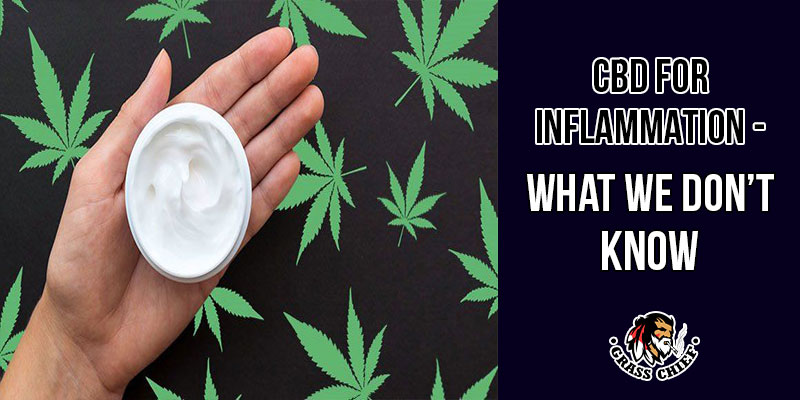CBD
CBD for Inflammation – What We Don’t Know
If you have suffered from, or suffering from any form of inflammation in your body, you’ll agree it’s not a pleasant experience. While there are many anti-inflammatory medications, CBD seems to stand out in the past few years.
It’s a common knowledge that using CBD for inflammation can take away a lot of pain and inflammation. But you might want to ask, “Does CBD work for inflammation?”
If you’re looking to learn all about CBD Anti Inflammatory effects, you’ve come to the right place! In this article, you will learn all you need to know about inflammation and what causes them, as well as the different CBD products and the best time to use them for inflammation.
Signs of Inflammation
Inflammation is the body’s natural response to injury, infection, or irritation. In its mild form, inflammation is vital to healing injuries, repairing cells, and restoring homeostasis. However, stress and chronic infections can cause the body’s inflammation response to become chronic and if not treated early, can affect health conditions.
In chronic inflammatory conditions, the body’s inflammatory response doesn’t subside with time like it would with an injury or infection. Instead, it can persist for weeks, months, or even years.
When you have chronic inflammation, it isn’t always easy to recognize the symptoms. That’s because chronic inflammation leaves the body’s system in a state of hyperactivity, so affected people often experience minor aches and pains that are unrelated to the inflammatory condition.
Symptoms of chronic inflammation can vary from person to person. Here are some of the most popular signs of inflammation;
- fatigue
- pain,
- hormonal imbalances,
- joint stiffness,
- joint pain,
- muscle soreness and aching,
- poor sleep,
- skin irritations,
- sinus problems.
If you are experiencing any of these symptoms, you most likely have some inflammation problems.
What Is The Main Cause of Inflammation in The Body?
Inflammation is a part of your body’s normal healing process; it occurs when your immune system identifies harmful stimuli and tries to remove them. For example, if you cut yourself, your immune system releases chemicals to fight the infection and help the healing process.
The brain sends chemical signals that tell the body’s cells to repair tissues. Red blood cells rush to the area to fight off infection, white blood cells rush to the area to attack bacteria and buff up the rest of the immune system, and platelets form at the site to help heal damaged tissue.
Although this process usually occurs quietly, the over-activeness of the immune system can cause chronic inflammation to set in.
Chronic inflammation can cause pain, swelling, redness, and stiffness. If untreated, chronic inflammation can result in serious health concerns, so it’s important to know what causes it and how you can avoid it.
Infections and structural damages, stress, poor food and lifestyle choices, certain medications, aging, among other factors can lead to chronic inflammation. At the same time, inflammation can also be rendered directly by bacteria or viruses and some physiological changes in response to an infection.
If you are exposed to some of the factors mentioned earlier, you should consider taking preventive actions to avoid inflammation in any part of your body, or better still, consider visiting a Doctor.
Is Cannabis Good for Inflammation?
Cannabidiol (CBD), a non-psychoactive cannabis compound, has been found to have significant anti-inflammatory properties. However, despite the growing body of research and reports from thousands of users, many unknowns remain about this substance.
There’s currently not much information available on the effectiveness of medical cannabis in easing inflammations. However, some interesting findings suggest that the use of cannabis for inflammation might play a vital role in its treatment.
The active ingredients in cannabis, the cannabinoids, work by binding to cell receptors in the body. These receptors, often called CB1, CB2, or GPR55, are found throughout the body, including in the brain, spinal cord, immune system, and a variety of other organs.
When cannabinoids bind to these receptors, they trigger a range of biological processes in humans, including regulating pain and mood. CB2 receptors are found primarily in the immune and nervous systems, with a significant concentration in the spleen. They are also found in nerves and inflammatory cells (think macrophages and T-cells), and, when activated, CB2 receptors can stimulate the production of anti-inflammatory molecules.
Cannabis Anti Inflammatory Study
The relationship between cannabis and inflammation is a subject of much debate, with an even split in scientific opinion. Some studies have found that cannabis can increase inflammation, while others have found cannabis to impact inflammation positively.
According to Curtin University in Perth, Western Australia, in a recent CBD Anti Inflammatory study, using cannabis was shown to reduce chronic inflammation in patients suffering from osteoarthritis.
Medical marijuana has also been shown to inhibit inflammation. In a study published in the Journal of Neuroendocrinology, researchers found THC, the main psychoactive component of marijuana, also a part of the cannabis plant.
Which Cannabinoid is Best for Inflammation
Everyone’s heard of CBD, which is derived from the Cannabis plant. But there’s more than just CBD out there. Tetrahydrocannabinol (THC) and Cannabidiol (CBD) are two other major cannabinoids in the plant.
THC is the cannabinoid responsible for the “high” you get when you consume marijuana, while CBD on the other hand, is not psychoactive. THC is generally stronger in marijuana, and most medical use case of marijuana is not made up of THC. CBD oil is still legal for medicinal purposes in the U.S., but THC products are not.
Overall, CBD are the best cannabinoid use in treating inflammations.
Best CBD Tinctures and Oils for Anti Inflammatory
The best CBD tinctures and oils for inflammation include full-spectrum tinctures and oils, tinctures mixed with a carrier oil, and vape oils. Because CBD-rich hemp oil can reduce inflammation throughout the body, it has the potential to treat many different health conditions.
Full-spectrum tinctures contain all of the CBD cannabinoids found in the hemp plant, including CBDa, CBG, CBC, CBN, and more. These kinds of tinctures include a variety of cannabinoids, and they have anti-inflammatory and healing properties throughout the entire product.
The oil in a full spectrum tincture is usually extracted using a CO2 extraction process that preserves all beneficial cannabinoids. A full spectrum tincture is considered complete because its content usually contains CBD and THC components.
Best CBD Creams for Anti Inflammation
With so many different types and brands available, it can be challenging to know which creams will best suit your needs. Finding the suitable CBD cream to help reduce inflammation depends on several factors, including the nature of pain you’re experiencing, the severity of the condition, and personal preference.
The best CBD creams for anti-inflammation usually contain epidiolex – a CBD-based medicine that the FDA has approved to treat pains. Other components of such creams could include hemp oil, coconut oil, shea butter, jojoba oil, beeswax, or even extra virgin olive oil. The oil gives the cream a fine texture, while the beeswax and shea butter provides a thick texture
Natural Remedies for Inflammation
CBD is the most common natural remedy for treating inflammation. However, there are also many other natural remedies that you could try out. Although not nearly as effective as CBD products, many people have reported a level of improvement in their bodies. Some of these remedies are include:
1. Turmeric
Turmeric is commonly used in curry dishes. It’s rich in a substance called curcumin, a compound that has been proven to help reduce inflammation. Consume turmeric with black pepper to enhance its absorption.
2. Ginger
Ginger, like turmeric, is rich in a substance called gingerol, which helps reduce inflammation. Consume ginger with black pepper to maximize absorption.
3. Peppers
Peppers contain a substance called capsaicin, which helps reduce inflammation and pain. Capsaicin can be found in chili pepper extract and cayenne pepper. Consume peppers with black pepper to enhance absorption.
4. Broccoli
Broccoli is rich in a compound called sulforaphane which is a quick remedy for body inflammation and joint pain.
Conclusion
Chronic inflammations can cause various health problems, one of which is chronic pain, characterized by pain that lasts long after the initial injury has healed.
CBD is one of the most viable remedy to inflammation problems and this article has proved as much. It’s an extract from the cannabis plant known for its medicinal and therapeutic benefits.
Using CBD for inflammation is legal in many countries now, which makes it very easy to get. Many people choose to use CBD products because they are very natural and non-toxic. CBD is known to help your body function better, which is why many people turn to it when they are in severe pain. CBD products contain some anti-inflammatory products that aid inflammation and pain relief.

